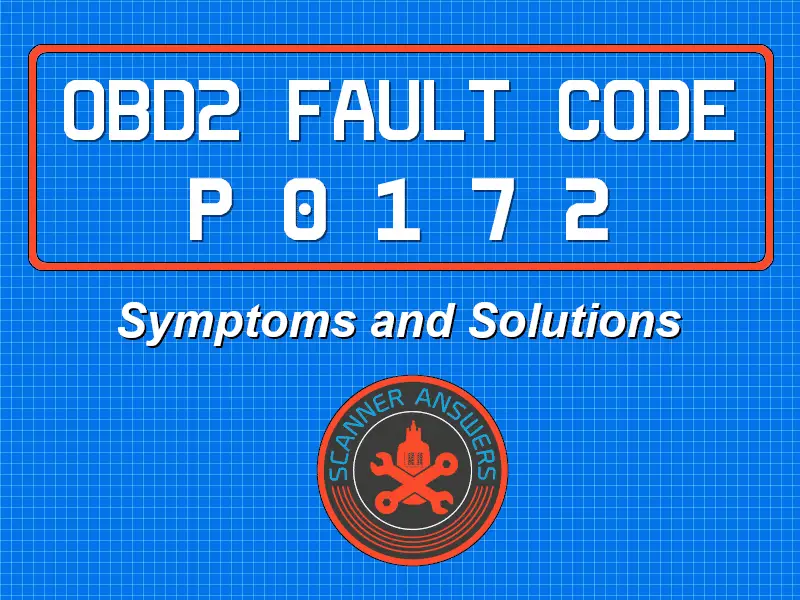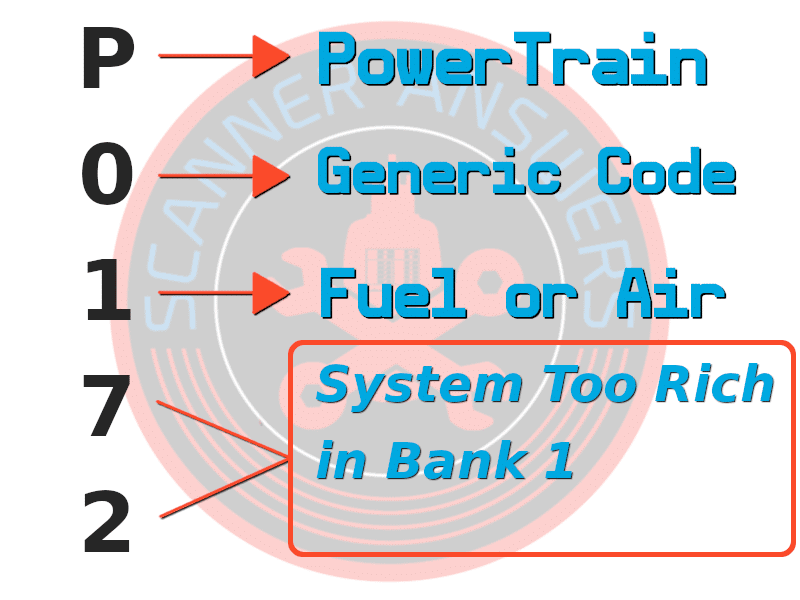
Meaning of a P0172 Code
The technical definition of the P0172 code is: System Too Rich in Bank 1
Similar to code P0171 which indicates the system is running too lean, the P0172 code is the exact opposite and the engine is running too rich (too much fuel). This code occurs when the ECU detects too much gasoline in the air-fuel ratio.
The ideal air to fuel ratio is 14.7 (air) to 1 (fuel). If the oxygen sensor detects too much gasoline in the exhaust gas, the ECU will try to compensate by adjusting the air-fuel ratio. However, if the ECU detects a larger than usual margin in the sensor readings, it will trigger a check engine light and the P0172 code.
Eric at South Main Auto Repair LLC did a great walk-through of troubleshooting this code on a 2006 Chevy Silverado where he ended up relearning the fuel trims to fix it. If you’re a Chevy owner or have a Flex Fuel engine, give it a watch!
What are the causes of P0172 OBD-II code?
Let’s break down this generic DTC first:
P0172 – System Too Rich in Bank 1The first letter of the fault code will indicate the family of the diagnostic trouble code. In this case, Powertrain:
- P = Powertrain (Engine or Drive Train)
The first digit in the error code will signify if the code is generic or manufacturer specific:
- 0 = Generic fault
The second number means specific codes for:
- 0, 1, and 2 = Air/fuel mixture
The third number helps narrow down the cause:
- 72 = System too rich
This means there’s too much fuel being delivered to the engine and it will show up due to a variety of reasons!

A lot of times this code is caused by running cheap fuel like E85, or even filling up with only a few gallons at a time. This is largely dependant on the vehicle and engine you’re working on.
The P0172 DTC can be triggered by many other factors. The first thing I like to check is the MAF or mass airflow sensor. Dirt or oil in the MAF sensor may overstate the amount of air entering inside the combustion chamber, which the ECU detects by telling the injectors to inject more fuel. Ultimately, this type of condition leads to an overly rich running condition.
But the P0172 code may also point to a faulty or bad O2 sensor. It can also be caused by bad or leaking injectors, a faulty fuel regulator, or a fault in the cooling system. However, worn out or fouled spark plugs can also the cause the motor to run rich.
Depending on the vehicle you’re working on, a simple fuel trim reset could solve the issue (as demonstrated by Eric in the video above).
Finally, the P0172 code can also be triggered by a vacuum leak, which requires the expertise of a professional mechanic or use of a smoke machine.
Here’s the most common causes of the P0172 DTC that we’ve encountered:
- Dirty or faulty Mass Airflow Sensor (MAF)
- Dirty or faulty Oxygen O2 sensor
- Vacuum leak

What are the symptoms of the P0172 DTC?
The good news is the P0172 fault will not cause a host of drivability problems. The first symptom is a check engine light followed by black smoke in the exhaust. The vehicle can still be driven despite the code, but you might notice a significant increase in fuel consumption and a strong scent in the exhaust fumes.
Here’s the most common symptoms of the P0171 fault code:
- Drop in fuel economy
- Black or blue exhaust smoke
- Poor acceleration
In worst cases, continued operation might result in carbon buildup inside the motor. If left unchecked, this condition can result in severe engine damage or accelerated wear and tear of internal components.
How much does it cost to fix P0171 fault?
The cost of fixing a P0171 code will vary.
Generally speaking, you can expect to spend $100 or lower if the problem is due to a faulty MAF sensor or bad O2 sensor. Most of the money you’ll spend is largely due to diagnostics and mechanic labor tim. Since the trouble code can be triggered by many factors, consulting an expert mechanic that utilizes the right tools and procedures won’t come cheap. The same goes true if the problem is caused by leaky injectors or a clogged fuel line.
But if you’re trying to save money, cleaning the MAF sensor, air filter and resetting the fuel trims and maybe even draining the tank and refilling with some high quality (non E85) fuel is usually enough to fix the problem. The mechanic should also check for any signs of exhaust leaks to rule out a sensor problem. Vacuum leaks can also be remedied cheaply by replacing rubber hoses and connectors.
-Mike
